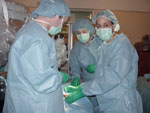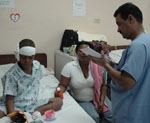
Return to Main Menu
|
Lambert hears, answers country's call
The following article describes one of
many poster presentations set for this year’s faculty convocation Aug.
22. The Catalyst will highlight some of the presentations on MUSC’s
international clinical, educational and research opportunities and
outreach. Photos provided by doctors.
by Heather Woolwine
Public
Relations
The allure of international outreach for many physicians is like that
of a multifaceted jewel, with each facet attracting those who desire to
answer a call, others who adore travel, and most whose veins course
with the simple need to do good.
 Judy Bucknam,
center, prepares to assist a Dominican Republic resident during surgery
in a small community hospital near Santo Domingo. Judy Bucknam,
center, prepares to assist a Dominican Republic resident during surgery
in a small community hospital near Santo Domingo.
The attraction to international service for Paul Lambert, M.D.,
encompasses these reasons and more. The Otolaryngology-Department of
Head and Neck Surgery chairman and professor began his mentorship with
Roberto Batista, M.D., and the Los Alcoresos Hospital in the Dominican
Republic just short of 10 years ago. Located about one hour west of
Santo Domingo, this small community hospital was started by the
Christian Medical and Dental Society and was later acquired by Medical
Mission International.
In 1996, Lambert and his oldest daughter, MUSC fourth-year medical
student Lara Lambert, traveled to the Dominican Republic to explore the
possibility of practicing ear surgery in the developing nation. Through
a connection with a company called ComCare which produced solar powered
hearing aids, Lambert was introduced to the need for ear surgery in
that country. At the time, Batista was in his final year of training,
and like Lambert, eager to develop human-itarian efforts for his
countrymen and women.
The one-story hospital had no history of performing ENT (ear, nose,
throat) surgeries and the operations it did were executed in four small
operating rooms (OR).
“About a year later, once we were ready to proceed, I was fortunate to
get companies to donate equipment for our trip, including two
OR-quality microscopes and two OR-quality drill systems identical to
the type of equipment that we used here,” Lambert said.
 Dr. Roberto
Batista, right, takes notes while discussing a patient's post-operative
care with his mother. Dr. Roberto
Batista, right, takes notes while discussing a patient's post-operative
care with his mother.
On that first venture and prior to joining MUSC, Lambert and his
University of Virginia colleagues, performed surgeries for 10
patients while beginning to teach Batista the delicate art of ear
surgery.
“The idea has always been to upgrade the skills of the physicians
indigenous to that area and teach them to become the best ear surgeons
that they can be, while at the same time hold some classes to help with
the overall ENT education of medical residents based out of Santo
Domingo,” he said.
In 1997, about 30 ENT physicians existed to serve the entire country of
8 million people, translating into less than one physician for every
250,000 people. “In addition, there was only one medical institution
graduating ENTs, and it was only turning out one new physician per
year,” Lambert added. “There was and still is a tremendous need.”
Since that first trip, Lambert and his various colleagues from
Virginia, Ohio State and MUSC have trekked to the Dominican Republic
once or twice per year.
Batista became the country’s leading ear surgeon. “He’s really become
an excellent surgeon, the best in the country. He has traveled here
several times since our relationship with the hospital began,” Lambert
said.
During the missions, Lambert, Batista and two additional surgeons
oper-ate continuously in three of the four ORs. (One OR must remain
free for emergencies.) Lambert said that Batista compiles and screens a
list of candidates pre-approved for surgery that can include up to 30
people. For continuity of care, Batista follows up with patients for
their post-operative care.
“With Batista’s national reputation and word of mouth that
international physicians are coming to the hospital, we now have a
two-to-three year waiting list. I’ve seen some incredible pathology
while working there and, unfortunately, people on the list have died
while waiting to be treated. Some of those people had such severe ear
infections that they contracted meningitis. What we see down there is
what most people only read about in textbooks.”
For instance, Lambert encountered an 18-year-old girl who was ashamed
to go out in public because of a foul-smelling discharge that
continuously oozed from her ear. A small rock had somehow lodged into
her ear canal and then eroded into her ear bone, thus creating
the infection. She dealt with the problem for seven years before
seeking and receiving treatment.
As the first ENT surgeons to conduct procedures in that particular
hospital, Lambert performed the country’s first cochlear implant and
the first procedure to alleviate congenital aural atresia, a condition
characterized by the absence of an ear canal and drum and a misshapen
outer ear.
At this time, Lambert, Batista and his colleagues have performed
approximately 300 surgeries for the people of the Santo Domingo area.
“Saying that something like this is a calling is not an unreasonable
word to use, but it is more than that,” Lambert said. “I wanted to
introduce all three of my children to situations faced by Third World
countries, travel, develop the camaraderie that colleagues have when
they do mission work together, and really offer a unique training and
educational experience for fellows and residents. When we are there,
performing about 30 surgeries in a week is very focused and repetitive.
That’s the same amount of experience that happens in two to three
months here. It’s time well spent in many ways but from an educational
standpoint, it’s incredibly valuable.”
Operation
Dominican Republic: A nurse’s perspective
“There are so many things. I have talked about it to everyone I know.
It was such a great feeling to know we helped 30 patients. Yes, we did
work from sunrise to sunset, but how good you felt at the end of the
day. When we arrived and were setting up the operating rooms, the
families who were waiting for the surgeries were very patient and
grateful. The children were so brave and went into the OR suites never
crying, and they never complained after surgery. Although I am not very
good with the language, it was so easy to communicate with the people
there. This was my first trip and I had no idea what to expect. It was
so rewarding to see families with their children, never being rude or
complaining if we were not able to do the surgery or running behind.
They just waited in the hot sun. They would bring the children and stay
all day and then stay all night with them in the hospital. I met a
wonderful doctor, Dr. Roberto Batista, who makes all the arrangements
for the procedures and follows the patients after their surgeries.
Roberto and I e-mail and send gifts; ours was an instant friendship.
This experience made me realize that we take so much of our own health
care for granted, by seeing the people of the Dominican Republic and
how they know it’s a privilege to have doctors devote time to their
children. For the children who could not hear and who had one ear
operated on before, they knew what it meant to have the gift of
hearing, and they were excited to have Dr. Lambert come back to operate
on the second ear. We saw some children with no ear canal; what a
stigma it must be for a child to not have the ear, when they are just
children and want to be normal. The hospital staff was so attentive to
our needs, and even where we stayed it was always a great expression of
the staff. I cannot wait to return, because I have a calling to help
them, and the best way I can do it is with Dr. Lambert. I could go on
and on… it has changed my life to see those children and know there is
a child who is experiencing hearing for the first time and will hear
his or her mother whisper into their ear when they have pain or
sorrow.”
—Judi Bucknam, R.N., Ambulatory
Care manager
Friday, July 21, 2006
Catalyst Online is published weekly,
updated
as needed and improved from time to time by the MUSC Office of Public
Relations
for the faculty, employees and students of the Medical University of
South
Carolina. Catalyst Online editor, Kim Draughn, can be reached at
792-4107
or by email, catalyst@musc.edu. Editorial copy can be submitted to
Catalyst
Online and to The Catalyst in print by fax, 792-6723, or by email to
catalyst@musc.edu. To place an ad in The Catalyst hardcopy, call Island
Publications at 849-1778, ext. 201.
|


